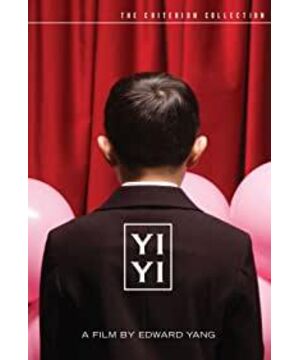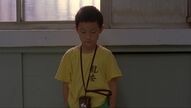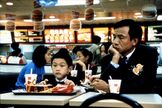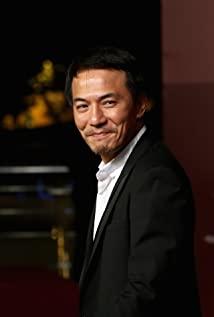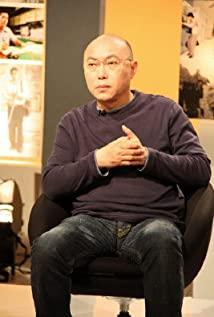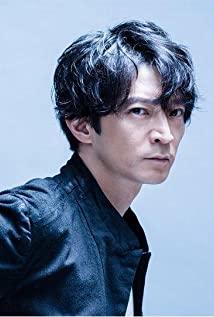"Yi Yi" is not a movie that makes people indulge in dreams, it pulls us to the other side of life. Dai Jinhua once said that Hollywood's storytelling technique is "hidden camera", and one of the usual techniques to hide the camera is to use the position of the lens as the point of view of the characters in the movie. In this way, we are like projecting ourselves onto the screen and dreaming for two hours at a time.
In "Yi Yi," this technique seems to disappear, and the camera mostly places itself in the position of a third person on set, sometimes even far and wide. It is especially like the perspective of God, or the story that the soul sees in the world. In the process, we are distanced from the people in the film. So, we started to think.
Yiyi, is written as "two" in the opening title of the film, revealing Yang Dechang's ambition, "Tao gives birth to one, one gives birth to two, two gives birth to three, and three gives birth to all things", which corresponds to the English name "A one and a two", What Yang Dechang wants to say is "all" . French media described "Yiyi" as "a poem of life", and the story was sung through the film.
Taiwan seems to have entered the process of urbanization earlier than the mainland. People's anxiety and depression in high-rise buildings are exactly the same as the problems in contemporary China. The fifth-generation directors' attachment to the land seems to be getting further and further away from us, replaced by the spiritual condition of people in modern civilization, just like what happened in the West and Taiwan. The protagonists in "Yi Yi" are all middle-class, the father Jian Junnan as a company director, Adi, who is engaged in investment, and Lily's mother, a senior financial manager, etc. The choice of the protagonist means the direction of the movie - the spiritual problem. A Rui cried to Jian Nanjun, "I have everything now, what should I be afraid of, if I divorce Rodney, I will not worry about food and clothing for the rest of my life."
The narrative of "Yi Yi" is quite complicated, and the director used many details to lay it out, but the breakthrough of the film is very clear - this family of four, father Jian Nanjun, mother Minmin, Yangyang, Tingting.
Dad: "It is impossible for a man to let another man teach him how to live" - truth and falsehood.
Whenever he needed to deceive people, Namjoon was often pushed out by his colleagues as a shield. The company members didn't seem to mind his thoughts, and they told him every time they waited until the decision was made. And the reason is "he looks more honest".
Nam Joon fell in love with music when he was young, but his mother and girlfriend all supported him to study electrical engineering and get a doctorate. So Namjoon chose to escape and left his girlfriend.
But is he living the life he wants?
In the movie, we can easily feel the estrangement between Jian Nanjun and his current wife, Minmin, even though they have two children together. There were no smiles, no hugs between them. When Minmin was crying bitterly, all Jian Nanjun did was stand silently. When the location moved to Tokyo, the man began to change. In the face of his first love, Namjoon has regained his vitality. With a smile on his face, he was so excited that he hugged Ari tightly.
The Japanese point to the film's metaphor "she is your music". Ari is what Namjoon once idealized and loved, but he chose to escape. Decades later, when he met Arui again, although the spark in his heart was ignited again, he still had to hesitate and retreat. This time, it was Ari who said goodbye in advance. Jian Nanjun got a period of his youth, but he couldn't go back after all, and his ideal was out of reach.
So much so that he said disappointedly, "living again, it won't make any difference". Jian Nanjun's cowardice and evasion doomed him to live under the mask of "honesty".
Mom: "What are you doing every day?, I feel like I've been living for nothing" - repeating days
Minmin has relatively few roles in the family of four, and it is from her mouth that an important theme of the movie is expressed, the monotony and poverty of life. Just like the title of a movie, life is one by one. Compared to his younger brother's newly-married Yan Er, he even spoke out because of the jealousy and jealousy between husband and wife. Minmin was more deeply in silence. As a middle-aged woman, I take care of my husband, son, and mother-in-law, and work between documents. She said, "I'm so busy at work, where can I spare time". She seems to be very busy. Her mother-in-law's illness made her calm down and have a chance to face herself. In telling herself, she found that life turned out to be so pale.
Thinking about what we've actually done tells us the most terrifying truth about life. And the meaning of the movie "Yi Yi" is also here, it inspires us to examine ourselves and face life.
Yangyang: "You can't see half of the things", "You can't see it yourself, I'll show you." - two sides of life
Although many people think that the father is the core protagonist of the film, Yangyang is undoubtedly the most suitable entry point.
After teasing the dean, Yangyang fled to the audio-visual classroom, sat in his seat, and saw Yunjuan Yunshu on the screen. It is of course Yang Dechang's intention to form a kind of intertextual relationship with us who watch movies outside the movies. The narration is also helping us to emphasize the film's theme "beautiful dances silently above our heads that we often miss without noticing".
The most striking thing about Yangyang is the homonym with director Yang Dechang's name. As it should be, Yangyang fell in love with photography, went to photograph the backs of people's heads, and also said the finishing touch of the film "You can't see it yourself, I'll show it to you". "One by one" here produces another layer of rich meanings, half seen and half invisible. Just like a person can only see the road in front of him, but not the road behind him. And the director here encourages us to discover the other half and see the complete life.
Tingting: "If it's really what you think, where would you need those love and romance stories to deceive yourself?" - living in an ideal self
Tingting is a girl who lives in an ideal. She also derived two other important roles, Lily and his boyfriend Fatty. In the eyes of the neighbor's aunt, Tingting is a good student who studied hard and was admitted to a girl in the north. In order to protect her psychological feelings, her father lied that he had seen her take out the trash before leaving.
And Lily can be said to be a master of love, playing with her fat boyfriend in the palm of her hand, and also fell in love with a handsome retired soldier by chance. Tingting, on the other hand, is more restrained and kind. When Fatty "betrayed" her and Lily rehabilitated, she was still persuading him not to mind too much and showing her open-mindedness. There is a wonderful metaphor for Tingting in the movie, a flower that cannot grow because of over-cultivation. Tingting is such a person who lives in an ideal world. She believes that as long as we treat others well, others will not treat us badly. Why do you think about killing people?
However, a tragic tragedy invaded her life, and Fatty killed Lily because he mistakenly thought he was having an affair with Lily. Meanwhile, another person died because of her. As the film comes to an end, the mother-in-law's life also comes to an end. In Tingting's ideal, her mother-in-law woke up and forgave her. The reality gave her another cruel knife. She said to her mother-in-law in her dream, "Why is this world different from what we thought?"
"Yiyi" has many branches, the relationship between the characters and the themes intersect. Different people can see their own "other half" and "back of the head" in movies.
Writer Zhou Guoping said: "Our childhood ended on the day we knew we would die." The director also arranged for Yangyang to read at the funeral, "Seeing my little cousin who hasn't given a name yet, I feel like I'm getting old too. ”. The main characters in the movie are all deeply involved in a three-person relationship, Mom and Dad and Ari, Tingting Lily and Fatty, Adi Yunyun and Yanyan, and from this comes the confusion and confusion in the relationship. Eight-year-old Yangyang has become an ignorant special case in the film. When bullied by a girl, he uses a balloon to frighten him back. He argues the truth with the teacher in class. His life is not perfect and smooth, but on Yangyang's face, we seem to Can't see the confusion that belongs to adults . But with the birth of his cousin, it also means that Yangyang will continue to grow up. Over and over again, human beings either live in material poverty or in spiritual confusion.
As a movie, the theme of "Yi Yi" is not clear. But the director intentionally ripped us apart a lot through the characters' lines. But I think the drama is still a little too strong, and it can be more lifelike and objective. Make the characters and themes of the film more ambiguous and rich. Of course, I might not understand it at all. Self-interpretation of movies using lines seems to be a characteristic of Yang Dechang, at least in the "Independence Times", "Guling Street" and "Yiyi" that I have watched. However, this is also in line with the identity of the protagonist of the film, "a middle-class senior intellectual, an elite family". Or maybe it also points to a more traditional proposition "I have heard a lot of truths, but still have a bad life". Just like the beautiful young man who seemed to know a lot and once said the golden sentence "without a tree, without a cloud, it is not beautiful", still stabbed the blade on others. Just like he is very thin, people still call him fat.
View more about Yi Yi: A One and a Two... reviews


